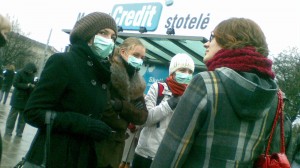
People wearing masks in public to stop the spread of swine flu have is a common sight in Vilnius, Lithuania's capital. Photo by Sco.
VILNIUS — The Lithuanian government announced Tuesday that the A/H1N1 flu pandemic has stabilized, and serious cases are decreasing since last week.
At least four people have died in the country due to A/H1N1 infection, and two other recent deaths are currently under investigation the virus. Forty-five municipalities are considered epidemic areas, and 922 schools — 65 percent of those in the country — are closed.
Raimundas Palaitis, the interior minister, told reporters at a press conference that the illness is trending downward. However, he did acknowledge that in Klaipėda the situation has gotten worse.
“In Klaipėda it seems that we missed it and it is increasing right now,” Palaitis said. “But it needs to be said that the situation in the country has stabilized.”
The government is not taking more drastic measures to combat the flu. Currently, hospitals are quarantined, schools and mass gatherings are recommended to be closed or postponed, and public workers are encouraged to wear masks.
“All of the main measures are working or are being fulfilled or have been fulfilled already. And they’re providing the results,” Palaitis said.
The ministries of health and social security and labor have jointly drafted a decree, which Palaitis said will be signed Tuesday that will make the receipt of sickness slips easier. Soon workers will be able to receive them over the phone. He said that this practice will be discontinued after the epidemic has been called off.
Palaitis said that the number of sick, 192 per week out of 10,000 residents, is still above the threshold for what is considered an epidemic.
Health ministry lashes out at Lithuania media
At the press conference Deputy Health Minister Artūras Skikas spoke after Palaitas and devoted large portions of his statement to excoriating the press for, what he called, “saying that the ministry is lying.”
Reports came out this week saying that the Ministry of Health has tried to cover up the number of A/H1N1 deaths by blaming it on pneuomonia or other bacterial diseases.
“I see a common tendency that is leaning not very nicely about the deaths, saying that the ministry is lying,” Skikas said. “We have to agree about one thing: the fact that people are dying and the question is from what, and what is the cause of the sickness?”
Skikas insinutated that recent reports about alleged cover-ups and people being turned away from hospitals have only exacerbated people’s fears.
“So that is why I want to ask you not to escalate this, and let’s say not discuss it too much,” Skikas said, adding that nobody should be turned away from a hospital, and if it is full then other medical instutions are obligated to accept the patient.
Skikas said that a lack of information comes from several factors: that worldwide health standards have recommended only testing the most dire flu cases, that diseases have to be confirmed by laboratories, that the information is compiled monthly.
Earlier in the conference, Palaitis said that “all of the infrastructure is working without a glitch.”
Skikas said that the ministry will release a report detailing not only deaths officially caused by swine flu, but also those of pneumonia and other bacterial diseases known to cause complications with the flu virus.
Although there has not yet been a set date for a new shipment of A/H1N1 vaccines, Skikas said that government lawyers are currently working with the manufacturer, which he called “a difficult procedure,” and that a contract should be signed this week.
Unlike last week’s press conference, which announced the pandemic, neither minister attempted to downplay the risk of the flu.
“I don’t think anyone wants to overlook a disease,” Skikas said, “especially in a situation like it is now.”












